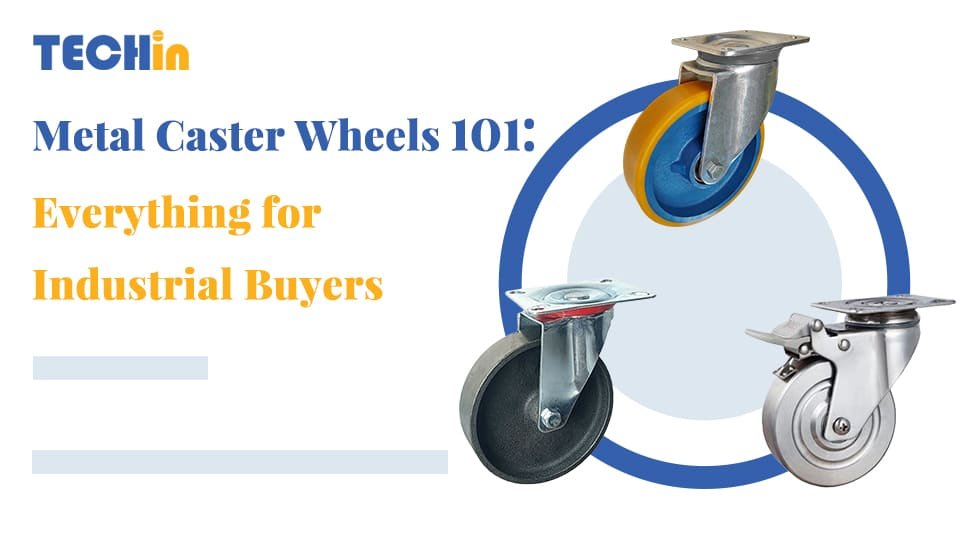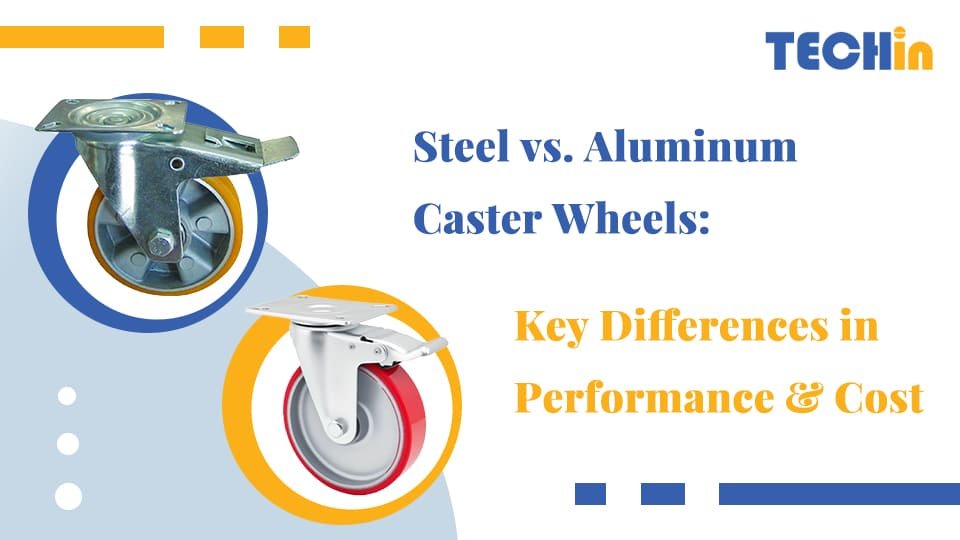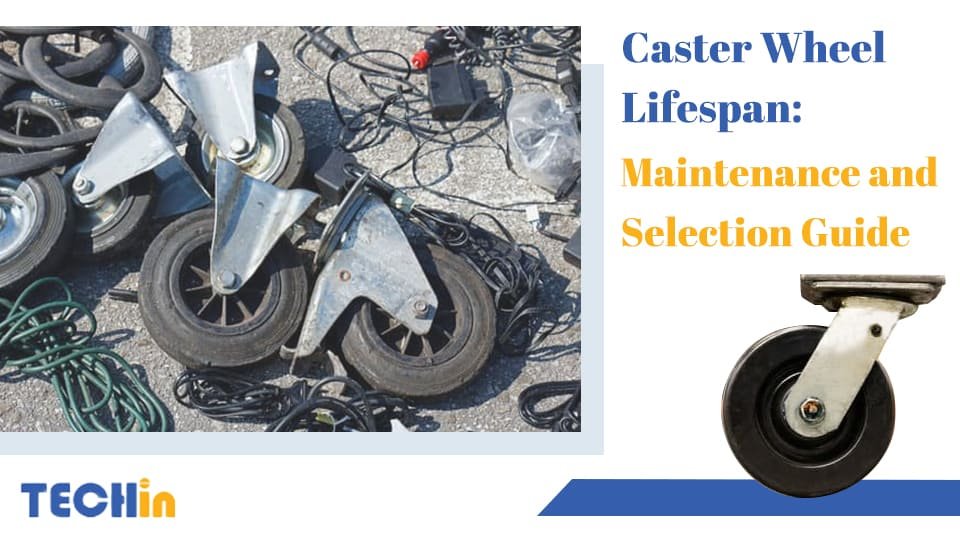Choosing the right casters is crucial to ensure durability, performance, and compatibility with various applications. Casters are essential in industries such as manufacturing, logistics, construction, and healthcare, where efficiency and safety are priorities. Whether for light, medium, or heavy duty use, understanding materials, sizes, and features can help buyers make informed decisions.
What Are Roller Wheels?
Roller wheels are what you use to move heavy stuff around. They make it easier to move things, help you work faster, and make it easier to move things around. You need them for everything from moving furniture around your house to moving big machines in a factory. A good roller wheel makes it easier to move things and helps you handle them without hurting yourself.
Key Features of Roller Wheels
To select the best roller wheels, it’s essential to understand their key features:
- High Durability: Engineered to withstand long-term use, especially under continuous or harsh conditions.
- Load Capacity: Available in varying capacities for light, medium, and heavy-duty use. Ranges from a few kilograms to several tons.
- Chemical and Temperature Resistance: Ideal for environments exposed to corrosive substances or extreme temperatures (cold storage or industrial ovens).
- Static Resistance: Prevents static electricity build-up, ensuring safety in sensitive environments like electronics manufacturing.
- Smooth Operation: Designed for silent and seamless rolling, reducing workplace noise and improving ergonomics.
- Surface Compatibility: Suitable for a range of surfaces, including smooth floors, uneven terrains, or wet and slippery areas.
Common Materials Used in Roller Wheels
Roller wheels are manufactured from a variety of materials, each with unique advantages:
| Material | Key Features | Common Applications |
|---|---|---|
| Rubber | Shock absorption, quiet, good on uneven surfaces | Office furniture, hospital beds, carts |
| Polyurethane | Durable, abrasion and chemical resistant, low noise | Warehouses, manufacturing plants |
| Polypropylene | Lightweight, economical, chemical and water resistant | Trolleys, light carts |
| TPR | Flexible, durable, floor-protective | Retail environments, display racks |
| Steel | Strong, wear resistant, handles high loads | Industrial machinery, heavy pallets |
| Cast Iron | Extremely durable, heat-resistant, heavy-duty use | Foundries, construction equipment |
Explore Techin’s High Quality Roller Wheels
Techin offers a premium range of industrial wheels designed to meet diverse industry needs. Our featured products combine advanced engineering with high-performance materials to deliver long-lasting durability and efficiency.
Featured Products Include:
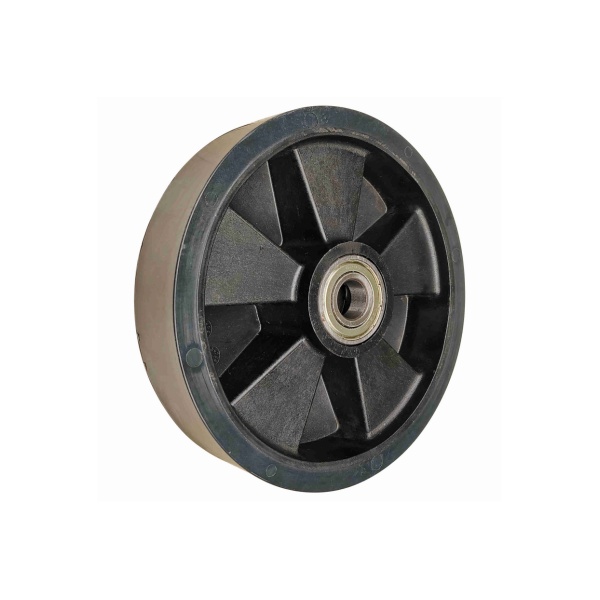
1. TPU Tread Polyamide 6 Core Wheels:
These wheels combine a tough Thermoplastic Polyurethane (TPU) tread with a Polyamide 6 (PA6) core, offering exceptional strength, resilience, and resistance to wear and tear. They are ideal for industrial environments requiring high performance under continuous use, ensuring durability and consistent operation.

2. Elastic Rubber Tread PA6 Core Wheels:
Featuring an elastic rubber tread for superior shock absorption and a robust PA6 core, these wheels deliver a smooth and quiet rolling experience. Perfect for applications that demand a balance of flexibility and strength, they excel on uneven or delicate surfaces without compromising durability.
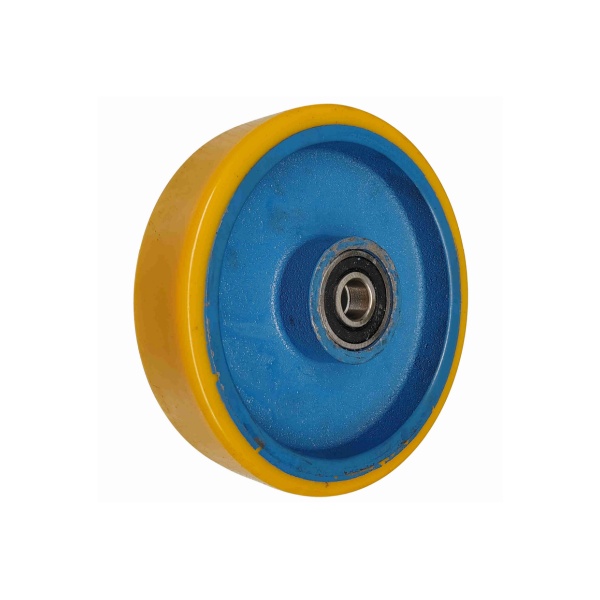
3. Polyurethane Tread Cast Iron Core Wheels:
With a durable polyurethane tread and a heavy-duty cast iron core, these wheels are designed for exceptional load-bearing capacity and long-lasting performance. They are ideal for handling heavy industrial loads in manufacturing and construction while providing excellent resistance to chemicals and abrasions.

3. Polyurethane Tread Aluminum Core Wheels:
Engineered for lightweight yet robust performance, these wheels feature a polyurethane tread bonded to a lightweight aluminum core. They offer an excellent combination of high load capacity and reduced overall weight, making them perfect for applications that require both strength and maneuverability.

4. PA6 Tread Rubber Core Sandwich Wheels:
These innovative wheels combine a PA6 tread with a rubber core in a sandwich-style construction, providing exceptional versatility. They deliver excellent grip, impact resistance, and flexibility, making them suitable for a wide range of industrial and commercial applications.
Roller Wheel Sizes: Light, Medium, and Heavy-Duty
Roller wheels are categorized based on their diameter and load-bearing capacity:
- Light Duty (15 mm to 75 mm):
- Designed for loads of up to 100 kg.
- Applications: Small trolleys, chairs, and lightweight furniture.
- Ideal for smooth indoor surfaces.
- Medium Duty (75 mm to 150 mm):
- Built to handle loads between 100 kg and 500 kg.
- Applications: Retail carts, medical beds, and moderate load-handling equipment.
- Performs well on slightly uneven or carpeted surfaces.
- Heavy Duty (150 mm to 300 mm or larger):
- Handles loads exceeding 500 kg.
- Applications: Industrial machinery, construction vehicles, and warehouse pallets.
- Suitable for rough and outdoor surfaces, including gravel and concrete.
Applications of Roller Wheels
Roller wheels are indispensable across various industries, thanks to their versatility and performance. Below are detailed examples of where they are commonly used:
- Manufacturing:
Roller wheels are critical for transporting raw materials, tools, and finished goods on the production floor. They enable seamless movement of heavy machinery components, assembly line carts, and material-handling trolleys. Their ability to withstand wear and tear in high-pressure environments makes them a key element in factory operations. - Warehousing and Logistics:
In warehouses and distribution centers, roller wheels facilitate the movement of pallets, storage racks, and transport carts. Heavy-duty wheels ensure smooth operation even with bulky loads, while static-resistant options prevent damage to sensitive electronic components during transit. - Healthcare:
Roller wheels enhance the mobility of hospital beds, wheelchairs, IV stands, and diagnostic equipment. Quiet operation and floor-protective materials like TPR and rubber ensure patient comfort and safety in sensitive environments. - Retail and Hospitality:
From shopping carts and display racks to luggage trolleys and food service carts, roller wheels are indispensable in retail stores, hotels, and restaurants. Their smooth rolling action, durability, and aesthetic appeal make them suitable for customer-facing applications. - Construction:
In rugged construction environments, roller wheels on heavy-duty equipment like scaffolding, concrete mixers, and tool carts provide stability and mobility. Durable materials like cast iron or steel handle the extreme weight and rough surfaces commonly found on job sites.
How to Choose the Right Roller Wheels
Selecting the right roller wheels involves evaluating key factors to ensure durability, efficiency, and suitability for the intended application:
- Determine the Load Requirements:
Calculate the total weight the wheels need to support, including the weight of the equipment and the maximum load it will carry. Ensure the wheels have a higher load capacity than the calculated requirement to account for uneven weight distribution and safety margins. - Assess the Surface Conditions:
Consider the type of surface where the wheels will operate. For smooth indoor surfaces, lightweight materials like polypropylene or thermoplastic rubber are sufficient. For rough or uneven surfaces, opt for polyurethane or rubber wheels with shock absorption and high durability. - Evaluate Environmental Factors:
Identify specific environmental conditions, such as exposure to chemicals, moisture, or extreme temperatures. Wheels made from polyurethane or steel are ideal for environments requiring resistance to harsh conditions. - Select the Appropriate Size:
Larger wheels (150 mm and above) are better suited for handling heavy loads and rough surfaces, while smaller wheels (15 mm to 75 mm) are suitable for lighter loads and smooth floors. Choose a size that balances load capacity with maneuverability. - Choose the Right Material:
Match the wheel material to the application’s requirements. For example:- Use rubber or TPR for quiet and floor-protective operations.
- Opt for polyurethane for heavy loads and resistance to chemicals.
- Select steel or cast iron for high-temperature or heavy-duty environments.
- Consider Wheel Design and Features:
Look for features like ball bearings for smoother rolling, static-resistant designs for sensitive environments, and reinforced cores for added strength. Evaluate whether swivel or fixed casters are more appropriate for the application.
FAQs
To help you make informed decisions about roller wheels, here are answers to some frequently asked questions. These cover essential topics like sizing, material choices, load capacities, and performance in various conditions.
Q1. How do I know what size casters to use?
Divide the total load by the number of casters minus one to determine the minimum load capacity per caster. For example, if a 4-caster cart holds 1,000 lbs., each caster should support at least 333 lbs.
Q2. What are the disadvantages of polyurethane wheels?
Polyurethane wheels can deform under high heat and have higher rolling resistance during high-speed operations. They may not absorb shocks as effectively as rubber wheels.
Q3. What material is used for a swivel caster wheel?
Swivel caster wheels are typically made from steel, cast iron, rubber, or polyurethane, depending on the application’s load and surface requirements.
Q4. How much weight will 4 casters hold?
The total weight capacity of 4 casters equals the sum of their individual capacities. For instance, if each caster supports 250 lbs., the total capacity is 1,000 lbs.
Q5. Can roller wheels handle extreme temperatures?
Yes, materials like polyurethane and steel are ideal for extreme temperature environments, including cold storage and high-heat applications.
Summary
Roller wheels are what you use to move heavy stuff around. They make it easier to move things, help you work faster, and make it easier to move things around. You need them for everything from moving furniture around your house to moving big machines in a factory. A good roller wheel makes it easier to move things and helps you handle them without hurting yourself.



